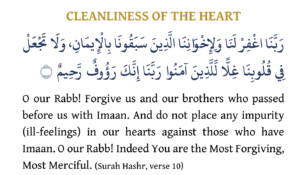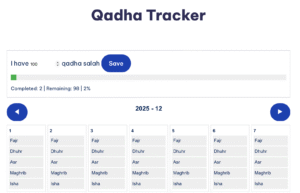بسم الله الرحمن الرحيم “Bismillah hir rahmanir rahim” : In the name of God, the Most Gracious , the Most Merciful.”
Ramadan Offer
Bismillah in English can also be written as : Bismillahi r-raḥmani r-raḥīm or bismillah al-rahman al-rahim
Bismillah or Basmalah is one of the most used phrase by Muslims.
Bismillah meaning in English:
The meaning of Bismillah in English is “In the Name of God, the Most Gracious , the Most Merciful.”
The meaning of bismillah in Urdu is ” شُروع اَللہ کے پاک نام سے جو بڑا مہر بان نہايت رحم والا ہے
The word Basmala is the abbreviation of the phrase “In the Name of God, the Most Gracious , the Most Merciful.”
| Bi | In |
| Ism | the name |
| Allah | of Allah |
| Ar Rahman | the Most Gracious |
| Ar Raheem | the Most Merciful |
Read secrets of surah fatiha
Bismillah in English:
bi-smi llāhi r-raḥmāni r-raḥīmi
Virtues of Bismillah
It was narrated from Abu Hurairah that the Messenger of Allah said: “Every important matter that does not start with praise of Allah, is devoid (of blessings).” (Sunan Ibn Majah)
Saying بسم الله has many great virtues and secrets, among them are:
- افتتح بها الله سبحانه وتعالى أفضل كتاب وهو القرآن الكريم : Allah began with it the best of the book and that is Quran al kareem.
- إذا قالها المؤمن موقنًا بها فإن في ذلك ستر للعورات عن نظر الجن، حيث قال رسول الله صلّ الله عليه وسلم ” سَترُ ما بين أعينِ الجنِّ وعوْراتِ بني آدمَ، إذا دخل أحدُهم الخلاءَ أن يقولَ: بسمِ اللهِ” : If the believer says it with certainty in it, then in that is a covering of the private parts from the sight of the jinn, as the Messenger of God, may God bless him and grant him peace, said: “It will cover what is between the eyes of the jinn and the private parts of the sons of Adam.
3. يسن أن يفتتح بها المسلم الكثير من العبادات كالوضوء والغسل والتيمم
It is Sunnah for a Muslim to begin many acts of worship, such as ablution, ghusl, and tayammum with bismillah
4. تكون دائمًا في بداية قراءة القرآن الكريم والحديث الشريف ومجالس الذكر
It is always read at the beginning of reading the Noble Qur’an, the Noble Hadith, and the gatherings of dhikr.
5. يسن للمسلم أن يبدأ بها الكثير من المباحات، قبل الأكل، حيث قال رسول الله صلّ الله عليه وسلم ” يا غلامُ، سمِّ اللهَ، وكُلْ بيمينِكَ، وكُلْ ممَّا يلِيكَ”، الجماع، فقد قال رسول الله صلّ الله عليه وسلم “لو أنَّ أحدَكم إذا أراد أن يأتيَ أهلَه، فقال: باسمِ اللهِ: اللهمَّ جنِّبْنا الشيطانَ، وجَنِّبِ الشيطانَ ما رزقتنا، فإنَّهُ إن يُقدَّرُ بينهما ولدٌ في ذلك، لم يضُرَّه شيطانٌ أبداً”
5 ways of Reciting Bismillah in Holy Qur’an
There are five ways to recite the Basmala in the Holy Qur’an, four of which are permitted by scholars and one is prohibited. As for the permissible aspects of recitation, they are:
الفصل بينها وبين آخر السورة التي تسبقها، وبينها وبين أول السورة التي تليها
1 Separation between it and the end of the surah that precedes it, and between it and the beginning of the surah that follows it.
الجمع بينها وبين آخر السورة التي تسبقها، وبينها وبين أول السورة التي تليها
2. Combining it with the end of the surah that precedes it, and between it and the beginning of the surah that follows it.
فصلها عن آخر السورة التي تسبقها، وجمعها بأول السورة التي تليها
3 Separate it from the end of the surah that precedes it, and combine it with the beginning of the surah that follows it.
ترك قراءتها بالكليّة
4 Quit reading it entirely.
أما الوجه الذي منعه العلماء في قراءة البسملة في القرآن الكريم فهو، جمعها بآخر السورة التي تسبقها، وفصلها عن أول السورة التي تليها، حيث قال للعلماء أنه يمكن للمستمع في ذلك الوقت أن يظن أنها نهاية السورة السابقة لها، وهذا يكون سبب في تعطيل المعنى المراد الإتيان بها، ذلك لأن معناها يتعلق بالبدء بالقراءة والشروع فيها، وليس في ختمها والانتهاء منها.
Read Quran notes
The first to write the basmalah
In كتاب الأوائل by Ibn Abi Asim Al-Shaibani, on the authority of Ibn Abbas, he said: The first to write in the name of God, the Most Gracious, the Most Merciful, Suleiman, peace be upon him, and in the أخبار مكة by Al-Azraqi: Al-Azraqi narrated on the authority of Ibrahim bin Uqbah that he said: I heard Umm Khalid bint Khalid bin Saeed bin Al-Aas say that my father was the first to write in the name of God, the Compassionate, the Merciful.
We note from that that there is no contradiction with what was mentioned in the kitab Al-Awael, and ikhbar makkah , as Prophet Suleiman, peace be upon him, was the first to write it mutlaqan , and that was when he sent a letter to Bilqis in order to invite her and her people to Islam, and also Khalid bin Saeed bin Al-Aas May God be pleased with him, who was the first among the people of Makkah to write the Basmala in the first books.
Benefits of Bismillah
Benefits of opening with the basmalah : And opening with the basmalah in everything of importance, three results are hoped for :
The first result : the belief that Allah will protect the Muslim with the basmalah from all evil. Because the mere mention of the name of God Almighty is a blessing and a protection against the occurrence of evil, and it is a protection and a distance from Satan’s impulses, misguidance and temptations.
The second result : starting with correct actions and sayings in the name of God Almighty will guide man to the right direction and lead him to the right path.
The third result : the Muslim will receive the help and blessing of God Almighty with the basmala.
In the basmalah, you seek blessing and seeking the help of God Almighty alone, otherwise the matter that he undertakes would be devoid of goodness and blessing.
Among the things for which it is recommended to mention the Basmala at the beginning:
The beginning of the speech, lecture, symposium, meeting or sermon, with the exception of the Friday and Eid sermons, rains and eclipses, because it was commanded to begin with al-Hamd.
Bismillah before Sexual intercourse
بِسْمِ الله اللّهُـمَّ جَنِّبْنا الشَّيْـطانَ، وَجَنِّبِ الشَّـيْطانَ ما رَزَقْـتَنا
Bismillāh. Allāhumma jannibnash-Shayṭān, wa jannibish-Shayṭāna mā razaqtanā.
With the Name of Allah. O Allah, keep the Devil away from us, and keep the Devil away from that which You provide for us. (Al-Bukhari 6/141, Muslim 2/1028.)
Bismillah saves from calamity
بِسـمِ اللهِ الذي لا يَضُـرُّ مَعَ اسمِـهِ شَيءٌ في الأرْضِ وَلا في السّمـاءِ وَهـوَ السّمـيعُ العَلـيم .
(ثلاث مرات)
Bismillāhi ‘l-ladhī lā yaḍurru ma`a-smihi shay’un fil-‘arḍi wa lā fis-samā’ wa huwas-Samī `ul-`Alīm.
In the Name of Allah, Who with His Name nothing can cause harm in the earth nor in the heavens, and He is the All-Hearing, the All-Knowing. (Recite three times in Arabic).
Reference:”Whoever recites it three times in the morning will not be afflicted by any calamity before evening, and whoever recites it three times in the evening will not be overtaken by any calamity before morning.” Abu Dawud 4/323, At-Tirmidhi 5/465, Ibn Majah 2/332, Ahmad. Ibn Majah’s chain of transmission is good (Hasan), Ibn Baz, p. 39.
Command to recite Bismillah
(ج) ومن الأمور التي يُستحب ذكر البسملة في أولها :
1- أول الحديث أو المحاضرة أو الندوة أو الاجتماع أو الخطبة، ما عدا خطبتي الجمعة والعيدين والاستسقاء والكسوف لورود الأمر ببدئها بالحمد .
والبدء بالبسملة أول الكلام الهام مأخوذ من افتتاح القرآن باسم الله تبارك وتعالى .
وفيما يلي ذكر للدعاء المقرون بالبسملة أو البسملة وحدها، في كثير من حالات المسلم اليومية :
2- عند دخول الخلاء؛ لحديث أنس رضى الله عنه : «بسم الله، اللهم إني أعوذ بك من الخبث والخبائث» (البخاري ومسلم ) .
3- وعند الوضوء؛ لحديث أبي هريرة «لا وضوء لمن لم يذكر اسم الله عليه» (أخرجه الترمذي وأحمد وغيرهما بإسناد صحيح عن أبي هريرة، «صحيح الجامع الصغير) .
4- وعند الأكل؛ لقول النبي صلى الله عليه وسلم لعمر بن أبي سلمة رضى الله عنهم : «سم الله، وكل بيمينك، وكل ما يليك» (البخاري ومسلم) .
ولحديث عائشة رضي الله عنها : «إذا أكل أحدكم طعامًا فليقل : بسم الله، فإن نسي في أوله فليقل : باسم الله في أوله وآخره» (صحيح سنن الترمذي» باختصار السند للشيخ الألباني وأبي داود) .
5- وعند دخول المسجد؛ لحديث أبي حميد وأبي أسيد : «بسم الله والصلاة والسلام على رسول الله، اللهم اغفر لي ذنوبي وافتح لي أبواب رحمتك» (يُنظر الروايات الواردة في ذلك في الأذكار للنووي وقد رواه مسلم والترمذي وابن ماجة وأبو داود والنسائي وفي «عمل اليوم والليلة» وابن السني) .
6- وعند الخروج من المسجد : «بسم الله والصلاة والسلام على رسول الله، اللهم إني أسألك من فضلك» (يُنظر الروايات الواردة في ذلك في الأذكار للنووي وقد رواه مسلم والترمذي وابن ماجة وأبو داود والنسائي وفي «عمل اليوم والليلة» وابن السني) .
7- وعند دخول المنزل : لحديث أبي مالك الأشعري رضي الله عنه : «بسم الله ولجنا وبسم الله خرجنا وعلى الله ربنا توكلنا»(سنن أبي داود) .
8- وعند الخروج من المنزل؛ لحديث أنس رضي الله عنه : «بسم الله توكلت على الله ولا حول ولا قوة إلا بالله» (أخرجه أبو داود والترمذي والنسائي في عمل اليوم والليلة) .
9- وعند ركوب السيارة وغيرها؛ لحديث علي بن أبي طالب رضى الله عنه: «بسم الله والحمد لله، سبحان الذي سخر لنا هذا وما كنا له مقرنين، وإنا إلى ربنا لمنقلبون» (صحيح الترمذي وسنن الترمذي وأبو داود) والنسائي في اليوم والليلة وسنده صحيح) .
10- وعند وضع الثياب لحديث أنس رضي الله عنه : «بسم الله الذي لا إله إلا هو»(صحيح الجامع الصغير وابن السنى) .
11- وعند تعطل السيارة أو الدابة ونحوهما : «بسم الله» (سنن أبي داود) .
12- وعند القيام من النوم؛ لحديث حذيفة رضي الله عنه أنه قال : وإذا استيقظ من منامه (أي: النبي صلى الله عليه وسلم) قال : «الحمد لله الذي أحيانا بعدما أماتنا وإليه النشور» (البخاري ومسلم) .
13- وعند الجماع؛ لما جاء في الصحيحين وغيرهما عن ابن عباس رضى الله عنهما أن رسول الله صلى الله عليه وسلم قال : «لو أن أحدكم إذا أراد أن يأتي أهله، قال : بسم الله، اللهم جنبنا الشيطان، وجنب الشيطان ما رزقتنا، فإنه إن يقدر بينهما ولد لم يضره الشيطان أبدًا» (البخاري ومسلم) .
14- وعند النوم؛ لحديث أبي هريرة رضي الله عنه : «باسمك ربي وضعت جنبي وبك أرفعه فإن أمسكت نفسي فارحمها، وإن أرسلتها فاحفظها بما تحفظ به عبادك الصالحين» (البخاري ومسلم) .
وفي حديث حذيفة رضى الله عنه قال : كان النبي صلى الله عليه وسلم إذا أراد أن ينام قال : «باسمك اللهم أموت وأحيا» (البخاري وفي الأدب المفرد له يُنظر: «مشكاة المصابيح» و«مختصر صحيح مسلم» حديث رقم (1897) وهو بلفظ (اللهم باسمك)) .
15- وفي الصباح والمساء كما في حديث عثمان بن عفان رضى الله عنهأن النبى صلى اله عليه وسلم قال : «ما من عبدٍ يقولُ في صباحِ كلِّ يومٍ و مساءَ كلِّ ليلةٍ : بسمِ اللهِ الذي لا يَضُرُّ مع اسمه شيءٌ في الأرضِ و لا في السماءِ ، و هو السميعُ العليمُ ثلاثَ مراتٍ ، فيضرُّه شيءٌ» (صحيح الترغيب) .
16- وعند الرقية كما في حديث عثمان بن أبي العاص رضى الله عنه أنه شكا إلى رسول الله صلى الله عليه وسلم وجعًا يجده في جسده، فقال له رسول الله صلى الله عليه وسلم : «ضع يدك على الذي تألم من جسدك وقل : بسم الله ثلاثًا، وقل سبع مرات : أعوذ بالله وقدرته من شر ما أجد وأحاذر»، وفي لفظ : «أعوذ بعزة الله وقدرته» (صحيح مسلم» وأبو داود وابن ماجة ) .
17- وعند الذبح كما جاء عن أنس رضي الله عنه عن النبي صلى الله عليه وسلم أنه كان يقول : «بسم الله، الله أكبر، اللهم صلِّ على محمد وعلى آله وسلم» («الأذكار» وهو في «صحيح مسلم» وأبي داود والترمذي وابن ماجة ) .
18- وعند إدخال الميت القبر كما جاء عن ابن عمر رضي الله عنهما أن النبي صلى الله عليه وسلم قال : « إذا وضعتُم موتاكم في قبورِهم فقولوا : بسمِ اللهِ ، و على سنةِ رسولِ اللهِ» (صحيح الجامع) .
Q: Is Bismillahi Rahamn- i-Raheem is part of Quran or not?
All Aimma are unanimous;it occurs once in Quran (verse #30,surah namal)
Q :Is Bismillah part of other Surahs or not?
Imam Malik(ra) :
• It is not part/juzz of Quran
• It is just a form of zikar
• Hence it is not juzz of any surah
Imam Shafae(ra):
• It is part of Surah Fateha
• There are both opinions with regards to Bismillah-i- rahman -i- Raheem being part of Quran or not but the preferred opinion is that it is in the beginning of every surah.
Imam Bukhari (ra):
• It is not part of a specific surah.
• Yes,It is part of Quran
• It causes Fasal between surahs of Quran
Imam Abu Hanifah(ra)
• It is part of Quran but not part of every surah
Discover more from Islam Hashtag
Subscribe to get the latest posts sent to your email.






